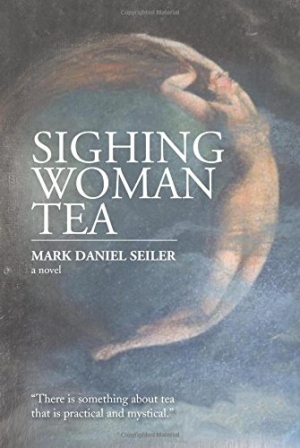Sighing Woman Tea
With larger-than-life antics, a firm setting, and a knowing wink at its own oddity, Sighing Woman Tea is a pleasure.
Sighing Woman Tea captures Viridis, a fictional island and source of a world-famous tea. Mark Daniel Seiler introduces fascinating, picaresque characters in a plot that combines the homecoming of a math genius with a military invasion. This spirited, imaginative comedy depicts the absurdity of a foreign occupation.
Thomas “Figas” Burke serves as the central figure in episodic chapters that move between characters, including an Italian film director who seeks permission for a documentary, and a tourist whose research on a signet ring inspires a lengthy detour set during the Crusades. Background on the medieval Thomas Burke, who wound his way toward Viridis, illuminates the island’s history and mythology, but distracts from the more engaging story of preserving livelihoods.
The start of the invasion—a critical plot point—begins nearly midway through the novel; previous events may seem like a prelude. Had the invasion been placed at the start, and spliced with other scenes throughout, the tension would heighten. The invasion would also serve as a focused, suspenseful point from which all the other threads follow. Once the invasion does begin, the pace quickens and the novel gains surer footing.
Among the strongest elements are characters such as Uncle Sun, an unflappable wit whose affection toward Figas shines clearly; Hu, a cantankerous, formidable leader; and Private Doogan, an Irishman tasked with uncovering where the island’s young men—presumed to be “terrorists”—have gone. Colorful dialogue replete with scholarly barbs reveals the islanders as highly literate, bemusing men and women who can’t resist needling each other even as they band together to thwart the military.
Humorous incidents underscore the islanders’ nonviolent protest. Creative tactics include an enormous quilt that blocks the soldiers’ path; unnecessary, bureaucratic paperwork; and bars of soap tainted with C. fargesii to lure the pesky “bengafly” toward the soldiers. The islanders’ clever conspiring reaches a questionable peak when they stage a tragedy that hinges on a gunman entering a school. The plot twist is slightly tempered by Doogan pointing out the cruelty of the plan.
“If the islanders believed in anything. it was informal spontaneity. Life was best experienced as a beautiful accident,” Seiler writes, inventing an outstanding cast. Scene after scene paints a community defending tradition amid change. Chapters on the islanders’ spiritual leanings at times lead to inexplicable visions, which emphasize the interrelated nature of all things. Tea—a commodity, ritual, way of life—is embedded in the islanders’ beings.
With larger-than-life antics, a firm setting, and a knowing wink at its own oddity, Sighing Woman Tea is a pleasure. Fans of small-town ensembles will relish this look at the struggle to protect a rich legacy.
Reviewed by
Karen Rigby
Disclosure: This article is not an endorsement, but a review. The publisher of this book provided free copies of the book and paid a small fee to have their book reviewed by a professional reviewer. Foreword Reviews and Clarion Reviews make no guarantee that the publisher will receive a positive review. Foreword Magazine, Inc. is disclosing this in accordance with the Federal Trade Commission’s 16 CFR, Part 255.

